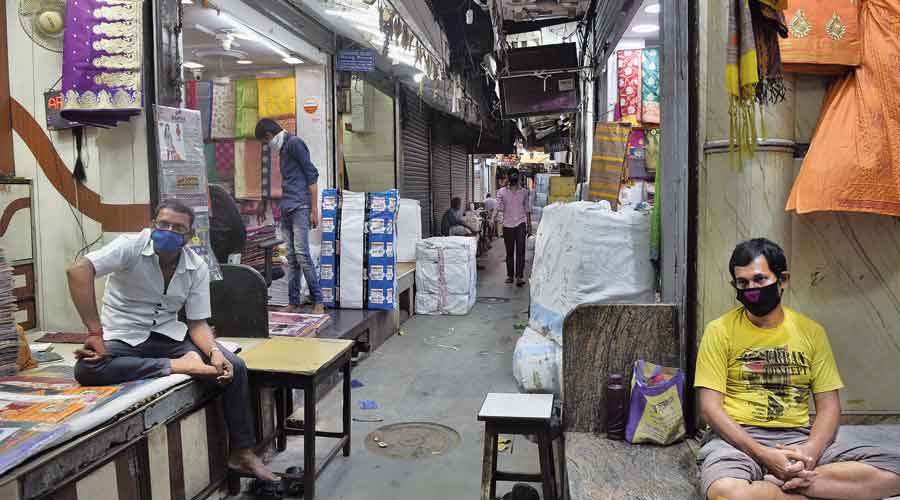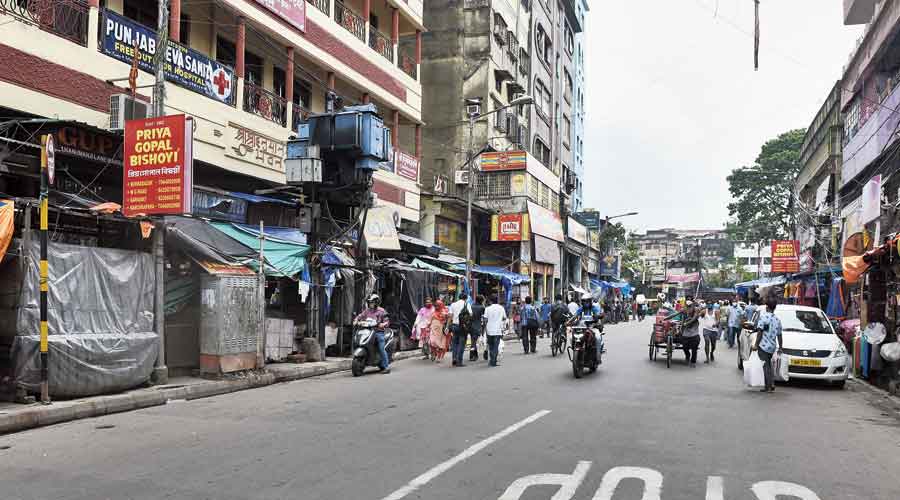A nearly empty Kalakar Street or a handful of people in Phageya Patti on a weekday afternoon would seem unimaginable to a Burrabazar regular who has not visited the trading hub recently.
Ask any trader from the area. He will say the ever busy and crowded lanes of Burrabazar have changed during the Covid-19 pandemic and the change is far from pleasant.
In the pre-Covid days, Posta in Burrabazar would see a turnover of around Rs 100 crore a day. That has come down to around Rs 4 to Rs 5 crore, a trader said. The textile trade is barely 15 per cent of what it used to be around this time of the year, post-Janmashthami and in the run up to Durga Puja, said a member of the Chamber of Textile Trade and Industry (Cotti).
Businesses are down, many shops are opening on alternate days, some are yet to open and customers are few and far between.
“We have not seen anything like this. Burrabazar has never seen businesses remain so low for so long,” said a Pawan Hamirbasia, a textile trader who has a shop on Jamnalal Bajaj Street.
Eastern India’s largest wholesale market, Burrabazar is a place where one can find almost anything under the sun. Garments, groceries, utensils, toys, paper products, spices, plastic items, use-and-throw cups and dishes, steel products, tarpaulin sheets, jewellery and what not. Almost all trades have been hit.
Textile trader Mahendra Jain, the secretary of Cotti, said they had already suffered huge losses during two peak business periods, Id and the Bengali New Year. “It seems the scene will not improve drastically before Durga Puja and Diwali. Usually around this time, we start supplying to our customers, most of whom are retailers. We had no time to breathe. But there is hardly any customer this year,” said Jain.
According to him, the textile trade in Burrabazar alone has suffered losses worth nearly Rs 10,000 crore in the four-and-a-half months since mid-March.
What that part of Burrabazar is to garment wholesalers, Posta is to those dealing with grocery items. Pulses, oil, flour, wheat, jaggery, salt, masalas — around 1,000 shops are in almost 24X7 business selling grocery items.
Trucks used to bring stuff from all parts of India at night. During the day, traders from across Bengal would flock to Posta to pick up their consignments.
Not anymore.
“Posta used to witness sales of around 600 tonnes of pulses a day. It has come down to around 50 tonnes a day,” said Chandan Chakrabarty, of Posta Bazar Byabsayee Samity. “The daily turnover at Posta was around Rs 100 crore a day before the pandemic. Now, it’s around Rs 4 to Rs 5 crore.”
Barring a small number of traders, who have been doing business for decades with several crores of rupees in credit, most regulars have shied away from the hub amid the pandemic. Many traders said the demand for grocery items across Bengal had come down and medium-sized traders were not feeling the urge to turn up at Calcutta for refills.
Retailers who would earlier turn up at Posta from district towns hiring Matadors and trucks have started establishing contacts with mills and factories in Madhya Pradesh, Rajasthan, Uttar Pradesh and Bihar for their supplies. Factories and mills from those states have started accepting smaller orders, something they did not do earlier. This has meant further loss for the wholesalers in Posta.
Faced with the downturn, several traders in Posta have decided to keep their shops shut for days. “Dukan khulney sey koi faida nahin. Bazaar nahin hain (There is no point keeping shops open. There is hardly any demand),” said a pulses trader from Jagannath Ghat Cross Road in Posta.
After the lockdown was relaxed in June, most stores in Burrabazar started to open on alternate days. If one shop opened on Mondays, the one next to it would open on Tuesdays. Traders said they had made the arrangement to avoid crowding as a precaution against Covid-19. Another decision they took was that the shops would remain open from 11am to 4pm.

Garment traders on MG Road wait for customers Sanat Kr Sinha
“We had expected business to gain momentum with time and we would extend our hours. But nothing has changed and almost all shops in Burrabazar close by 5pm. Earlier, they would remain open till 7pm,” said a trader.
The toy business, too, has been hit. Mohit Banthia, a wholesale trader of toys, said business was down by nearly 75 per cent. “We had a lot of customers from outside the state but not any more. I open my shop thrice a week. If the government imposes lockdown on one of those days, my earning takes a further hit,” he said.
The dip in business means that the earnings of lakhs of people who work in the trade hub and are involved in allied services such as transportation and loading and unloading have been hit hard, too.
The transport business, which thrived on ferrying stuff to districts or to other states in eastern India, is struggling, too. “A truck on an average is carrying 10 to 20 tonnes of goods, compared with its capacity to carry 50 tonnes. Orders from outside have dipped. Truck owners will not make any profit by carrying so little goods,” said one trader.
Across Burrabazar, goods are unloaded from trucks from faraway places between 5am and 3pm. Even in early March, this would go on till 10pm.
“Earlier, around 450 trucks would leave Burrabazar and Posta daily on an average. Now, barely 200 leave,” said Krishna Singh, a transporter.










